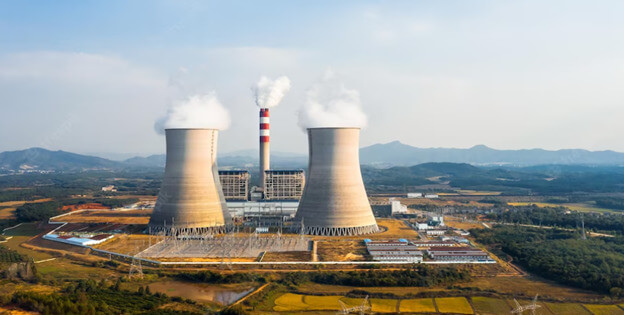Nuclear Energy
Nuclear energy is energy that releases energy from the nucleus of an atom. It is the energy contained within the nucleus of an atom that holds the protons and neutrons together. This energy is released through heat, light, and radiation when a nuclear reaction occurs. Nuclear energy can generate electricity, power ships, and even power spacecraft. Nuclear power plants are the most common type of nuclear energy facility, producing about 10% of the world’s electricity. Nuclear energy is a clean, reliable, and efficient form of energy that is better for the environment than burning fossil fuels.
Advantages
Nuclear energy has many advantages over traditional energy sources, such as coal and natural gas. Here are the top benefits of nuclear energy:
- Low Pollution: Nuclear energy produces deficient levels of air pollution compared to other energy sources. Nuclear plants emit virtually no sulfur dioxide, particulates, mercury, or other air pollutants than coal-fired power plants. It translates to healthier air quality and fewer health risks associated with air pollution.
- Abundant Fuel Supply: Nuclear fuel is abundant and widely available. Uranium is the most commonly used nuclear fuel, and estimation tells that there will be enough uranium to power the world for the next several decades. We can also reprocess and reuse atomic fuel, making it an even more attractive energy source.
- High Energy Density: Nuclear energy has a much higher energy density than other energy sources. A small amount of nuclear fuel can produce a lot of energy. It makes nuclear energy an attractive option for large-scale energy production.
- Cost-Effective: Nuclear energy is often more cost-effective than other energy sources. While the upfront costs of building a nuclear power plant can be high, the cost of producing energy from nuclear fuel is very low. It makes nuclear energy a cost-effective option for power production.
- Low Carbon Footprint: Nuclear energy produces deficient levels of carbon emissions. It makes it an attractive option for countries looking to reduce carbon emissions. As more countries move to reduce their emissions, nuclear energy will become an even more attractive option.
Disadvantages
- Radioactive Waste: Nuclear energy produces radioactive waste that can remain hazardous to humans and the environment for hundreds or thousands of years. Proper waste management is crucial to prevent adverse environmental and public health impacts. It is essential to properly sort and handle waste materials to optimize recycling efforts and minimize potential hazards. However, the process is difficult and expensive.
- Accidents: Nuclear accidents like those at Three Mile Island and Chernobyl are rare but can have devastating consequences. The effects of a nuclear accident can be felt for decades and can cause irreparable damage to the environment.
- Cost: Nuclear energy is expensive to build and maintain. The cost of constructing a nuclear power plant is very high and can take up to 10 years to complete. Additionally, the cost of disposing of nuclear waste is high and can cause financial burdens for countries that rely heavily on nuclear energy.
- Proliferation: Nuclear power plants can produce weapons-grade material, which can utilize to create nuclear weapons. It is a significant concern for many countries and can increase international tensions.
- Limited Resources: Uranium, the fuel used in nuclear reactors, is a limited resource and is not found in large amounts in many places. Countries that rely heavily on nuclear energy may need help to secure enough fuel to operate their power plants.
Comparative Points on Advantages and Disadvantages of Nuclear Energy
Nuclear energy is a valuable source of clean energy, as it produces low levels of carbon emissions and is a reliable source of energy. It can provide a steady and reliable electricity source and have a wide range of products, from medical isotopes to fertilizers. There are some disadvantages too. The most significant burden is the potential for a nuclear accident, which can release dangerous radiation and contaminate large areas.
- Additionally, building and maintaining nuclear plants can be prohibitively expensive, and nuclear waste disposal is a complex and costly problem. Finally, nuclear energy is only widely accepted in some countries due to the fear of nuclear accidents and the issues surrounding nuclear waste.
- Nuclear energy has both its advantages and disadvantages. On the positive side, it is a clean energy source with low emissions, is reliable and efficient, and does not rely on non-renewable resources. Additionally, managing nuclear waste is a complex and ongoing challenge that must be approached with the utmost care and attention.
Conclusion
Overall, nuclear energy has many advantages and disadvantages that should be taken care of when deciding on energy production. Nuclear power is a highly efficient and cost-effective energy source with zero carbon emissions. However, using nuclear power as an energy source must consider the potential for accidents and the difficulties of safely disposing of nuclear waste.
Recommended Articles
We hope that this EDUCBA information on “Advantages and Disadvantages of Nuclear Energy” was beneficial to you. You can view EDUCBA’s recommended articles for more information,

